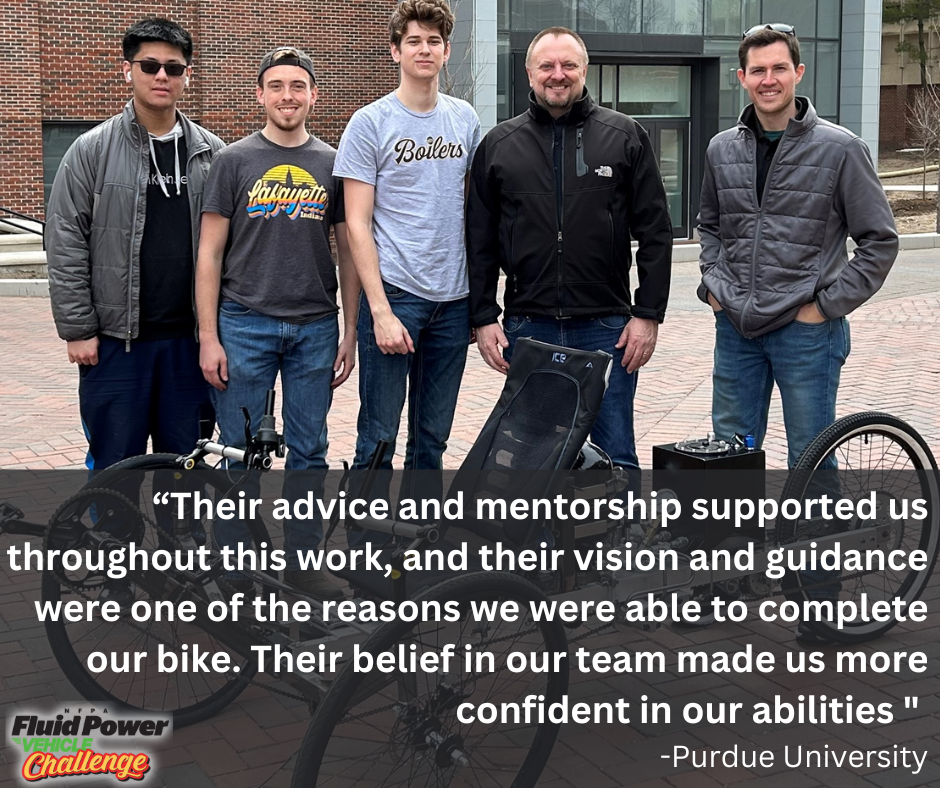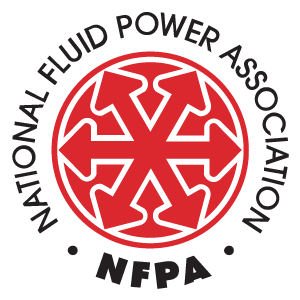As the school year approaches, we are actively seeking industry mentors for three of NFPA’s Workforce Development Programs, all of which provide opportunities for increased company visibility and recruiting offerings.
The first is for the Fluid Power Vehicle Challenge. This is an undergraduate program that requires engineering students to redesign a traditional bicycle using hydraulics as power transmission and compete for cash prizes in four separate races – sprint, efficiency, regen, and endurance. Students experience real world engineering under strict deadlines for designing, building, testing and demonstrating their designs. NFPA Pascal Society Donors and industry professionals serve as mentors and judges to guide the students in their learning. We are expecting to have 24 participating teams in the upcoming year, and we’ll need at least one industry mentor for each team. From help with sizing motors and pumps and understanding the benefits and drawbacks of various hose fitting options to focusing in on the fundamental hydraulic circuit, the expertise of industry mentors is instrumental in preparing students for their project and future fluid power careers. The program runs from September to April and serves as a great opportunity to get to know the students, see how they collaborate, extend employment offers, and create long lasting relationships with university faculty.

The second is through the Robotics Challenge. This scholarship program helps build awareness of fluid power benefits and careers among high school students. The scholarship awards $30,000 ($7,500 per year for four years) to a high school senior who participates in a FIRST® Robotics, National Robotics League, or VEX Robotics Competition Team and uses fluid power in their competition robot. The robotics teams and/or engineering clubs often seek advice from industry representatives on how to incorporate pneumatics in their designs. This serves as a rewarding platform to guide students as they work on their projects and introduce them to your company and careers in our industry.
The third is through the Fluid Power Clubs. NFPA supports student organizations with up to $2,000 in stipend funding to help them learn about fluid power while working on educational and technical projects, and other fun activities. We are currently renewing applications with the 20 universities that were funded last year and will be in need of NFPA members to guide them as they work on their technical projects. This is another direct opportunity to engage with students around a topic that interests them and increase your company visibility among the various organizations.
To get involved as an industry mentor or for more information contact Stephanie at sscaccianoce@nfpa.com.
Like this post? Share it!
Recent Posts
Explore Speaker Lineup for NFPA’s 2025 Annual Conference
2025 NFPA Annual ConferenceFebruary 25-27, 2025Tucson, AZRegistration Now Open NFPA’s upcoming 2025 Annual Conference will feature a lineup of expert speakers dedicated to sharing valuable insights and information with attendees. Ranging in topics from geopolitical disruption to the future of fluid power updates, attendees can expect the presentations to provide exclusive content that can’t be found anywhere…
Please Complete and Share Survey on Drivers in Fluid Power Customer Markets
The National Fluid Power Association (NFPA) seeks to engage with stakeholders across the fluid power supply chain to publish a technology roadmap for fluid power in industrial, or in-plant, applications. This roadmap will be a document that describes the evolving needs of companies in fluid power’s many industrial customer markets, the degree to which fluid…
Oxford Economics Winter Fluid Power Forecast Out Now!
Global Fluid Power Report and Forecast includes a global macro summary, by-country customer market forecast & analysis, as well as by-country fluid power industry forecasts. Countries covered in the report: US, Canada, Mexico, Brazil Poland, Netherlands, Italy, Germany, France, Belgium, UK, Russia, Taiwan, South Korea, Japan, Indonesia, India, China, Australia, UAE, and South Africa. Oxford Economics released the…



